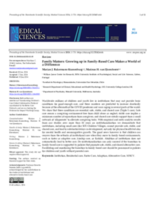Worldwide millions of children and youth live in institutions that may not provide basic conditions for good-enough care, and these numbers are predicted to increase drastically because of the aftermath of the COVID pandemic and wars raging in several parts of the world. The authors show that three conditions are essential: safe, stable, and shared care (Triple S care).
Safe care means a caregiving environment free from child abuse or neglect; stable care implies a minimum number of separations from caregivers; and shared care entails support from a small network of 'alloparents' to alleviate caregiving tasks. With empirical and meta-analytic results from our studies over more than 30 years on institutionalization they demonstrate that institutions, including small ones like SOS Children Villages, cannot provide safe, stable, and shared care, and lead to substantial delays in development, not only for physical health but also for mental health and neurocognitive growth.
The good news however is that children can recover from the setbacks of institutional care when they move to family-based environments, such as foster or adoptive care, kinship care, or Kafalah. Abolition of institutions does not automatically lead to better care.
De-institutionalization can only succeed if the transition to family-based care is supported by policies that promote safe, stable, and shared alternative care. Facilitating and monitoring the transition to family-based care should be paramount in policies for children and youth without parental care.

